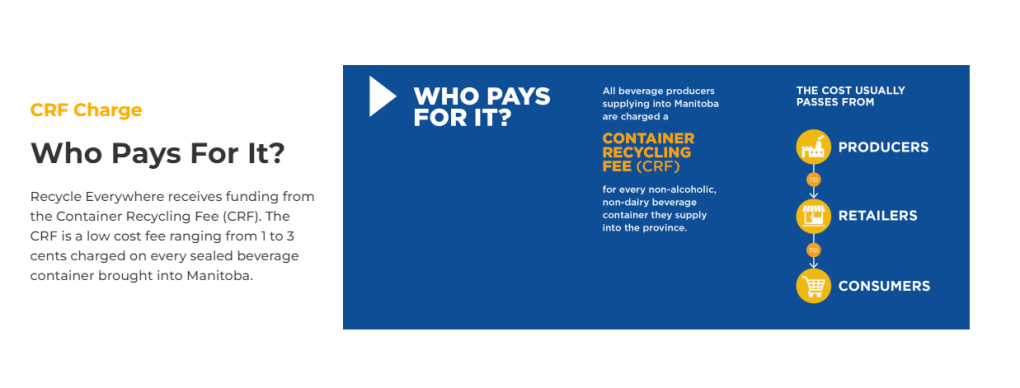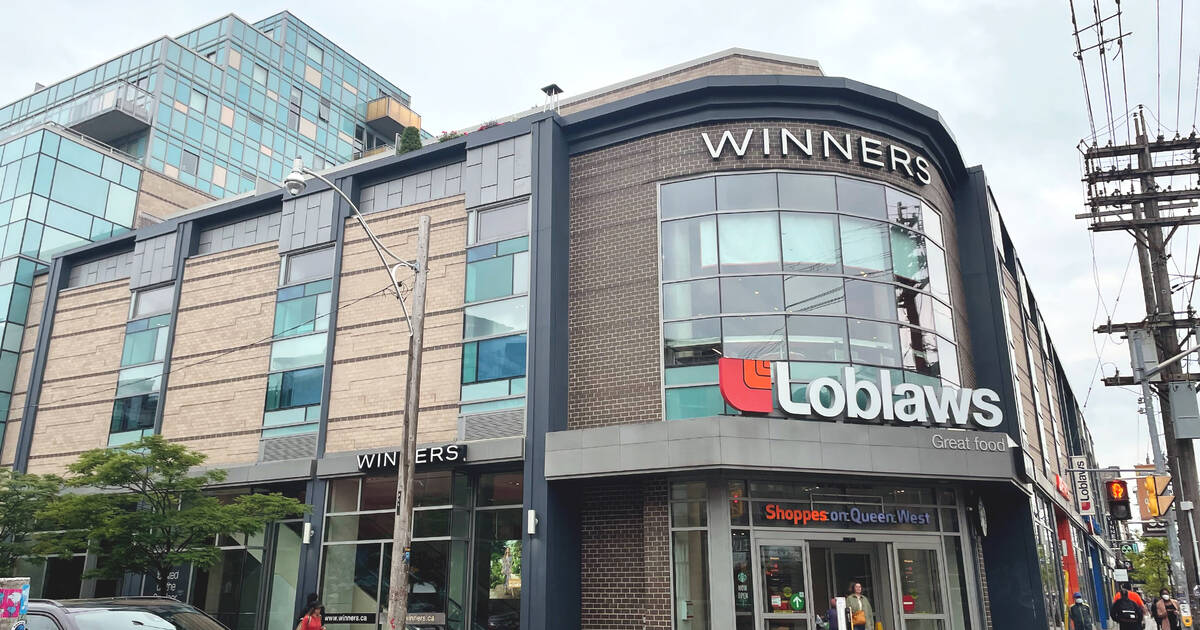And now you can buy beer and wine in grocery stores.
You are using an out of date browser. It may not display this or other websites correctly.
You should upgrade or use an alternative browser.
You should upgrade or use an alternative browser.
LCBO / The Beer Store
- Thread starter Whoaccio
- Start date
W. K. Lis
Superstar
Not yet at the corner mom-n-pop convenience stores (except in northern Ontario). Just corporate or franchises for now.And now you can buy beer and wine in grocery stores.
W. K. Lis
Superstar
Could The Beer start accepting non-alcoholic beverages cans & bottles?
Ontario consumers could be hit with new fees on pop and juice next month
From link.Producers of non-alcoholic beverages are set to impose new recycling fees on Ontario consumers next month as environmental advocates argue the province should take cues from the Beer Store and implement a different system.
The Canadian Beverage Container Recycling Association (CBCRA) is imposing the fees on beverage companies as of June 1, about two months later than originally planned to allow for further consultation.
The CBCRA is an industry-funded organization made up of large waste producers, with stewards like Coca Cola, Loblaw Companies ltd and Nestle Canada.
These companies are technically on the hook for these fees, which vary between one and three cents per item. The initiative, called “Recycle Everywhere,” is part of Ontario’s Blue Box regulations and puts the onus on producers of waste to fund recycling systems.
However, the CBCRA told CTV News Toronto earlier this year that producers have “discretion” over whether to pass along the costs to consumers, indicating that individuals could see the fees on checkout receipts for items like pop, juice, or bottled water.
A chart on their website shows the trickle-down effect of how this could occur, with producers charging retailers, who in turn up the pricetag of their items.

Over the last few months, the Ontario government has reiterated their expectation that consumers not be charged additional fees to support the recycling program, but officials stopped short of saying if there will be any consequences for companies that choose to subsidize the cost.
“It’s our expectation that producers are able to mitigate any additional costs on consumers by leveraging their extensive experience in operating similar programs in other jurisdictions while utilizing new technology and innovation available to them,” a spokesperson for the minister of environment said in a statement to CTV News Toronto this week.
“Large beverage producers are fully aware of the Government of Ontario’s position on recycling fees. Our expectations have been made clear, there should be no new fees imposed on consumers in Ontario.”
1.7 BILLION PLASTIC BOTTLES WASTED IN ONTARIO
The CBCRA says it plans to install 250,000 new recycling bins across the province as part of the Ontario’s pledge to recover 80 per cent of beverage containers by 2030.
“With over 30 per cent of beverage containers consumed away from home, more beverage container recycling bins in public and private commercial spaces across the province are needed to reach the recovery targets set in the Blue Box Regulation,” Executive Director Ken Friesen said in a statement.
Friesen noted that in Manitoba, a similar program raised beverage container recovery rates from 42 per cent to 72 per cent within 10 years.
The province’s recycling efforts are measured using the weight of blue box materials reused by producers, according to the 2021 regulation outlining the changes.
But environmental advocates warn this recycling program won’t be enough to achieve that 80 per cent return in Ontario.
Karen Wirsig, Senior Program Manager for Plastics at Environmental Defence, told CTV News Toronto Wednesday that while Ontario’s goals are “pretty significant,” experts do not believe they can realistically be met.
“Our collective experience with these kinds of recycling bin systems is that they're much less effective at getting these materials to the right places for recycling,” she noted.
Wirsig noted the sorting system, in addition to human nature, is working against the government.
“We estimate that 1.7 billion plastic bottles alone are wasted in Ontario every year, meaning they go into the landfills or incinerators or even directly into the natural environment,” she said, adding that there is also no economic incentive to use a blue bin.
“Whereas with deposit return, you put that can in the garbage, you're throwing away 10 cents.”
BEER STORE RETURN SYSTEM CAN WORK FOR POP CANS
A survey conducted by Environics Research and commissioned by Environmental Defence suggests more than three-quarters of Ontarians would support a deposit-return program for non-alcoholic beverage containers.
Under this kind of program, consumers would be charged a recycling fee when purchasing a beverage, but if they were to bring the cans or bottles back, that money would be returned.
In 2021, nearly 80 per cent of packaging and containers sold at the Beer Store were returned and recycled or refilled. There was a 43 per cent collection rate for beverage containers and packaging through Ontario’s blue box system that same year.
“It's net neutral for consumers,” Green Party Leader Mike Schreiner told CTV News Toronto in an interview Thursday.
While Schreiner supports moving the financial burden or recycling from municipalities to large waste producers, he says it will be challenging for Ontario to achieve that 80 per cent target without implementing something like a deposit-return system.
“The fact that they're passing those costs on to consumers, I understand why consumers are upset with that. So why not go with a program that has proven to have much higher diversion recycling rates, and will not put the cost burden on to consumers.”
If Ontario implements a deposit-return system, Schreiner says it is possible to reach this target, although he argues the province should be trying to match the federal collection goal of 90 per cent for plastic beverage bottles.
“We also want to just reduce the amount of waste produced in the first place especially plastic waste, given how harmful it is to human health and the environment and animal and marine life health in particular.”
Deposit-return programs for non-alcoholic beverages already exist in Alberta, Saskatchewan, Quebec and British Columbia.
afransen
Senior Member
I'd be in favour of deposit-return for plastic bottles. Cans, however, have a pretty high recycling rate already.
W. K. Lis
Superstar
I remember as a kid in the 1950's being able to pick up empty pop bottles and collect them (5¢ refund each). Was able to buy comic books (10¢ each then).I'd be in favour of deposit-return for plastic bottles. Cans, however, have a pretty high recycling rate already.
The refund price for empty alcohol cans and bottles have not kept up with inflation. (Change comic book prices to include the $.)
TossYourJacket
Senior Member
Ideally we should expand the recycling program, both in terms of scope and availability. My local beer store closed in 2020, presumably for condo construction. No condo was built, and now that site is up for sale. So all that happened was an entire neighbourhood lost the one place for anyone without a car to return empties. And now the next closest beer store (which wasn't exactly close as it was if you're carrying a bunch of empties) has also closed (to build a different condo).
The Beer Store recycling program is super convenient, if you either live a few minutes walk from a Beer Store, or you have a car, but outside of those scenarios, it leaves a lot to be desired. So yeah, I agree we should do more deposit based recycling, but it cannot just be through the Beer Store.
The Beer Store recycling program is super convenient, if you either live a few minutes walk from a Beer Store, or you have a car, but outside of those scenarios, it leaves a lot to be desired. So yeah, I agree we should do more deposit based recycling, but it cannot just be through the Beer Store.
ShonTron
Moderator
Member Bio
- Joined
- Apr 24, 2007
- Messages
- 12,462
- Reaction score
- 9,251
- Location
- Ward 13 - Toronto Centre
Ideally we should expand the recycling program, both in terms of scope and availability. My local beer store closed in 2020, presumably for condo construction. No condo was built, and now that site is up for sale. So all that happened was an entire neighbourhood lost the one place for anyone without a car to return empties. And now the next closest beer store (which wasn't exactly close as it was if you're carrying a bunch of empties) has also closed (to build a different condo).
The Beer Store recycling program is super convenient, if you either live a few minutes walk from a Beer Store, or you have a car, but outside of those scenarios, it leaves a lot to be desired. So yeah, I agree we should do more deposit based recycling, but it cannot just be through the Beer Store.
The nearest Beer Store to us doesn’t take empties. The next closest location recently closed, for a condo that hasn’t started construction yet. But it was a dank store, with long lines of down-and-out patrons with huge carts of bottles and cans.
They never made it easy or pleasant.
gabe
Senior Member
Good for the LCBO and Beer Stores, not so good for those who don't own cars.... I like having my local Loblaws selling beer and wine. I can just walk down the street for a six pack or a bottle of wine.

 www.blogto.com
www.blogto.com

Loblaws stops selling beer and wine at select Toronto locations
It appears that after getting the long-awaited green light to start selling certain alcoholic beverages in Ontario back in 2015, Loblaws is covertl...
Northern Light
Superstar
Good for the LCBO and Beer Stores, not so good for those who don't own cars.... I like having my local Loblaws selling beer and wine. I can just walk down the street for a six pack or a bottle of wine.

Loblaws stops selling beer and wine at select Toronto locations
It appears that after getting the long-awaited green light to start selling certain alcoholic beverages in Ontario back in 2015, Loblaws is covertl...www.blogto.com
I agree, I like supermarket sales and would like to see that widen rather than contract.
But I do understand that shoplifting and issues with intoxicated persons are consequential as considerations.
Also, the stores really do make very little return on selling wine.
That said, Loblaws paid for those licenses and I would be surprised if they're not shuffled to a 'lower risk' location.
***
Side tangent our favourite exemplars of journalism above implied in their story that Loblaws owns Freshco, which is will be news to Empire (the actual owners)
ShonTron
Moderator
Member Bio
- Joined
- Apr 24, 2007
- Messages
- 12,462
- Reaction score
- 9,251
- Location
- Ward 13 - Toronto Centre
I was a little surprised that the Metro store on Gould Street carried beer and cider, though it was convenient in a pinch. However, it’s kept in sight of the cash registers and the security guard.
I haven’t been in there the last few weeks so I don’t know if they dropped sales.
I haven’t been in there the last few weeks so I don’t know if they dropped sales.
afransen
Senior Member
Makes me think it would be good if someone, say TPA/Bike Share, offered short-term (e?)cargo bikes rentals. For most people, they only need a cargo bike every once in a while, and it could help replace car trips for those who choose not to own them. Would be great for grocery shopping too.Ideally we should expand the recycling program, both in terms of scope and availability. My local beer store closed in 2020, presumably for condo construction. No condo was built, and now that site is up for sale. So all that happened was an entire neighbourhood lost the one place for anyone without a car to return empties. And now the next closest beer store (which wasn't exactly close as it was if you're carrying a bunch of empties) has also closed (to build a different condo).
The Beer Store recycling program is super convenient, if you either live a few minutes walk from a Beer Store, or you have a car, but outside of those scenarios, it leaves a lot to be desired. So yeah, I agree we should do more deposit based recycling, but it cannot just be through the Beer Store.
afransen
Senior Member
My understanding is that the profit the grocers could earn from selling beer/wine was quite meager. It was mainly added as a traffic driver. If grocers are starting to see a lot of shrink, it might make it un-viable to maintain the department merely for traffic.Good for the LCBO and Beer Stores, not so good for those who don't own cars.... I like having my local Loblaws selling beer and wine. I can just walk down the street for a six pack or a bottle of wine.

Loblaws stops selling beer and wine at select Toronto locations
It appears that after getting the long-awaited green light to start selling certain alcoholic beverages in Ontario back in 2015, Loblaws is covertl...www.blogto.com
I think it was last fall when, while I was waiting for an attendant at the self-checkout to help me with something, I saw a gentleman pretend to futz around with a checkout, grab a loose plastic bag and tuck a bottle of wine into it and walk out, giving me a wink as he walked past the distracted self-checkout attendant. He was wearing a TTC jacket.
Northern Light
Superstar
My understanding is that the profit the grocers could earn from selling beer/wine was quite meager. It was mainly added as a traffic driver. If grocers are starting to see a lot of shrink, it might make it un-viable to maintain the department merely for traffic.
This is correct. The wholesale price paid vs the retail price is very, very thin. Relative to the value of the shelf space, wine/beer is not a money maker.
To be clear, that's because wholesale in Ontario, to my understanding, is something close to 90% of retail.
Which is patently absurd.
Northern Light
Superstar
I never saw the point of selling wine in grocery stores, but hopefully the selection is better than what is on offer in Québec (essentially 99% SAQ-bottled plonk). Eataly has kept an extensive selection of Italian products that cannot be found anywhere else (if you can stomach their huge markup). Just try to find a Dolcetto d'Alba, interesting vermouths or even a Lambrusco at the LCBO.
The selection in stores varies; but the Metro near me has maybe 250 wines, it's really not a bad selection, much better than Quebec.
It's mostly the accessible stuff, a mixture of Canadian and International (US/Italy/Aussie all represented).
Three Thieves is a decent product for its price point; but you'll see a smattering of upper-middle range ($30-$45 per bottle)
As to the point of selling in stores, to me, it's walkability. I mean where I'm at in East York there's one awkwardly placed LCBO about 1.5km away, the next closest are 3.5km and 5km away; where as I have 4 supermarkets within a 15M walk.
It's different downtown,where you have an LCBO in your building and in most parts of DT there's a location within 1km (15M walk for the average person); but outside the core those distances can get quite large.
I like to shop every other day or so, buy what I'm inspired to cook, then pair that w/the right wine.
I don't drink swill, but not every day needs to be the finest Ammarone, Barolo or Old Vine Zin; sometimes a perfectly servicable Tuscan Sangiovese or Pinot Grigio is just fine.
Last edited:
evandyk
Senior Member
I think I have five LCBOs within just over a km of my building. Plus the store in St. Lawrence Market.It's different downtown,where you have an LCBO in your building and in most parts of DT there's a location within 1km (15M walk for the average person); but outside the core those distances can get quite large.




